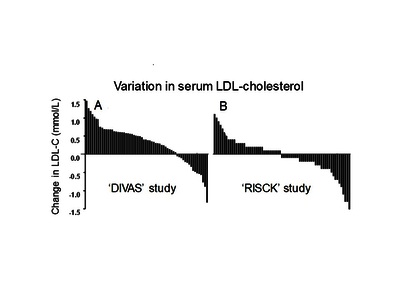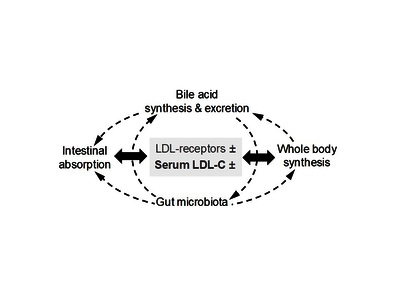Does variation in serum LDL-cholesterol response to dietary fatty acids help explain the controversy over fat quality and cardiovascular disease risk?
Griffin, B. A., Mensink, R. P. and Lovegrove, J. A.
It is advisable to refer to the publisher's version if you intend to cite from this work. See Guidance on citing. To link to this item DOI: 10.1016/j.atherosclerosis.2021.03.024 Abstract/SummaryBackground and Aims: Controversy over fat quality and cardiovascular disease risk stems from a series of meta-analyses of prospective cohort and randomised intervention trials, which found little evidence for a significant relationship between the intake of saturated fat and disease endpoints. Possible explanations for these null findings include difficulties inherent in estimating true food intake, the confounding effects of macronutrient replacement and food composition, and marked inter-individual variation in the response of serum LDL-cholesterol. The aim of this narrative review was to present evidence for the existence and origins of variation in serum LDL-cholesterol response to the replacement of dietary saturated fat, and its potential to explain the controversy over the latter. Methods/Results: The review provides evidence to suggest that variation in LDL-responsiveness may harbour significant potential to confound the relationship between saturated fat and atherosclerotic cardiovascular disease risk, thus undermining the effectiveness of the dietary guideline to replace saturated fat with unsaturated fat. Conclusions: the identification and application of a simple biomarker of this phenomenon, would make it possible to tailor dietary guidelines to LDL responsive individuals, who stand to gain a greater benefit to their cardiovascular health.
Download Statistics DownloadsDownloads per month over past year Altmetric Deposit Details University Staff: Request a correction | Centaur Editors: Update this record |
 Tools
Tools Tools
Tools
![Figures 1A & 1B.jpg [thumbnail of Figures 1A & 1B.jpg]](https://centaur.reading.ac.uk/99743/2.hassmallThumbnailVersion/Figures%201A%20%26%201B.jpg)

![Figure 2.jpg [thumbnail of Figure 2.jpg]](https://centaur.reading.ac.uk/99743/3.hassmallThumbnailVersion/Figure%202.jpg)

![Figures 3 290321.jpg [thumbnail of Figures 3 290321.jpg]](https://centaur.reading.ac.uk/99743/4.hassmallThumbnailVersion/Figures%203%20290321.jpg)
